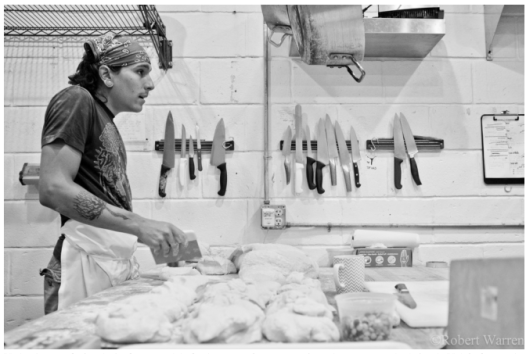Editor’s note: Writer and photographer Robert Warren likes to tell stories. With pen and lens. In a new partnership with NolaVie, he will offer each month a bit of background on one of his in-depth photo stories about things that are quintessentially New Orleans. The column also will offer an excerpt from one of Robert’s pieces to whet your appetite for his photos and prose; by all means, click the link at the bottom of the story to enjoy the full offering. Today he visits the Pizza Delicious kitchen for some hands-on pie basics.

NOLA writer and photographer Robert Warren
I don’t know the fine line between fiction and non-fiction. To me, a story is a story and veracity is whatever the tale-teller says it is. Maybe it’s because I’ve always held a pen in one hand and a camera in the other.
Maybe that’s where the confusion began.
With the camera there is a tendency to produce an image and say, “Look, there it is. That’s the thing.” The picture feels precise, accurate. We find it hard to debate pixels on a sensor with the same mind that struggles to convince the police radar we were going 30 and not 31 (or worse, those automated speed traps that popped up a few years ago and unceremoniously mail you the evidence). But the human mind is not only a product of the hard data of denotation, but also the artistry of connotation.
The mind says, “Sure, I was speeding, but do you know why?”
So there a story often begins, the race to the hospital with the pregnant wife in the back seat, dashing to the airport to convince a lover to not catch the late flight; we romanticize in the space between the hard data.
This is the space where I create a Photo Story, where I combine words and images into something greater than the sum of the digital parts.
It’s reading between the pixels, so to speak.
And this feels right.
I stood one Sunday morning in the corner of the Pizza Delicious kitchen between the fresh painted masonry and a radiating oven door swinging in a constant state of open and close. My camera was slung over my shoulder and I was asking Nic a barrage of questions as he slid the pizzas onto the hot decks, organizing and reorganizing five pies in varying states of completion.
The camera might show you his features, the strong limbs and kind smile, the baseball cap snug tight on his head, but it misses the personality, the soul even.
There begins the work of the pen.
He’s a Minnesota farm boy, a veteran, hasn’t missed a harvest since he can remember; he’s an author. He’s much more than a baseball cap and a smile sweating in front of a pizza oven.
And that, the image and the word, creates a different kind of truth in storytelling, and as far as what counts as fiction or non-fiction, I’ll let the journalists and novelists figure it out.

(Photo: Robert Warren)
When I open the door of the renovated warehouse, I see a flurry of activity. Mike and Greg greet me warmly and then promptly return to their busy prep-work for the ensuing Sunday. It’s Football Sunday; they expect it to be slammed for a little while.
Brendan is the first person I get a chance to speak with.
He has been tucked in the back corner of the kitchen expertly cutting and weighing portions of soft dough. He’s looking at the scale intently, pinching and picking from the remaining pile, nudging the LED screen on the digital scale toward a number between 630 and 660 grams. Without looking up he tells me how much each dough ball should weigh for the perfect 18-inch pizza (I won’t tell, though. Some secrets should remain in house).
He moves like all good prep-chefs, working a complex process out through their hands, intimately connected to the tools and product he is handling. Step by step, like watching the tones of a watercolor take shape out of pure color, Brendin sorts, and rolls, and turns, and organizes the dough into something perfect. And it isn’t ready until it’s perfect.
His hands maneuver effortlessly, the sign of great practice and confidence in work, and that’s what’s striking about Brendan, and as I find out over the course of the day, Pizza Delicious itself.
Within the exterior shell of a hipster-esque warehouse in a gentrifying neighborhood in a city that is constantly barraged by insults, either those of being too antiquated and reminiscent of the agrarian and human trade that made it wealthy, or of being a passive recipient of ultra-modern Brooklynization manifest in poorly dressed private school graduates searching its potholed streets on single speed bicycles for something to believe in–within that redesigned warehouse is a reality that escapes oversimplification and deserves no insult.
Within 617 Piety is work ethic, focus, and a passion for quality. It is a magnet in a developing neighborhood drawing those of substance towards it.
Brendan puts the finishing touches on the dough.
Read the Pizza Delicious story in its entirety here.
 NOLAbeings Multimedia artist Claire Bangser created NOLAbeings as a portrait-based story project that marries...
NOLAbeings Multimedia artist Claire Bangser created NOLAbeings as a portrait-based story project that marries...  Voodoo in New Orleans: Reviving history: New Orleans fortune telling This article takes a deep dive into the history of Voodoo in New Orleans, its hybridization with Catholicism, and its present-day place in the city's culture. The author visits fortune-tellers in the French Quarter, using their guidance as a tool for introspection rather than a deterministic predictor of the future. Through her experiences in New Orleans, the author feels a mystical connection to both the past and the future.
Voodoo in New Orleans: Reviving history: New Orleans fortune telling This article takes a deep dive into the history of Voodoo in New Orleans, its hybridization with Catholicism, and its present-day place in the city's culture. The author visits fortune-tellers in the French Quarter, using their guidance as a tool for introspection rather than a deterministic predictor of the future. Through her experiences in New Orleans, the author feels a mystical connection to both the past and the future. 